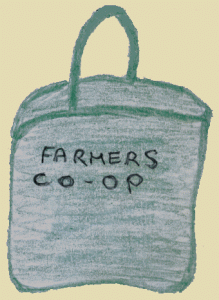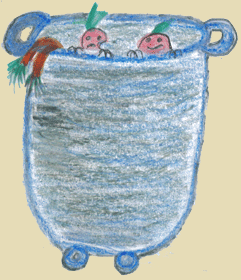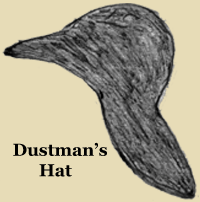 The inconvenient “good old” days contained some very “good old” ecological ways.
The inconvenient “good old” days contained some very “good old” ecological ways.
I grew up seventy-two years ago in a small seaside town in England. To anyone under thirty-five, seventy-two is ancient; the rest of us marvel at how fast time passes. With no refrigeration, you shopped once a week or you ate something out of a can for dinner.
Before plastic, people all over the world used some sort of cloth shopping bag. It might be a fancy store-bought item or something simple, sewn from a piece of left over cotton. The burlap that potatoes used to come in made useful shopping bags.
Thankfully the cloth bag has re-appeared, but the supermarkets still have thick rolls of smaller plastic bags for vegetables and bulk items and the ‘I will not disintegrate for about twenty thousand years’ plastic bags are still very much in place.
Unless you lived off the beaten track, you either took a bus or rode a bike. Baskets on bicycles for men were made from wire rather than the more feminine wicker. For children old enough to ride a bike responsibly, the weekly trip to the grocery store was a sought after outing. Included were lessons in finance; money was in short supply, so there was always a tight budget. Everything had to be carefully examined. Was your selection really a bargain or just second rate goods? Common courtesy was practiced. You were always polite to the person behind the counter. You never tried to jump the queue and, if you misbehaved, you stayed at home for the next few weeks.
At the store, fresh, unpackaged produce went straight into your bag. Loose goods like flour and rice were measured out into a plain paper bag which when emptied at home, was carefully folded and re-used. One of the much sought after treats at the end of the outing was to bite into a large, deep purple Victoria Plum. We children would stand in the back yard, grinning happily as the sweet plum juice ran down our fingers and chin and onto a hand-smocked play pinafore. Another treat was to savor a crisp, tart, un-radiated, unwaxed, fresh from the orchard apple and one or two pieces of hard candy. (Sweets to us.) The great dilemma: should we eat them now or keep them to tease our siblings with later?
With so many sanitary ways in which to present modern goods, it’s hard to accept the overwrapped, ecologically damaging packaging our industries insist on maintaining. It’s time for us all to insist that business step up to the plate and realize that less packaging will save money as well as the environment.
* * *
“My old man’s a Dustman
He wears a Dustman’s hat…”
* * *
Translated, that old English song reads:
“My husband works for a refuse collection agency. He carries the tin garbage cans (dustbins) on his shoulders from people’s backyards and empties them into a truck. He wears a cap with a flap attached to the back, like those worn by the old French Foreign Legion, in order to keep any debris from touching the back of his neck. Household garbage went straight into the can and the can was rinsed clean with a garden hose. Any organic matter that spilled onto the ground was turned into fertilizer. When the
tin rusted it was allowed to disintegrate back into the earth – ashes into ashes. Yes, the operation was inconvenient, but, as a very wise man recently told me, “Your conveniences are killing you!”
Unless we come up with biodegradable trash bags, not bigger and stronger ones that won’t, “Oh, my goodness! Tear and leave a smelly mess for us to clean up!”, we will never clean up the disgusting, earth-killing, smelly mess we have created with our landfills. The same very wise man also advised, “You are not moving forward fast enough. You need to peddle backwards for a few years to give yourselves a chance to remove the mounds of pollution you have already caused.”
Plastic garbage cans are easy to rinse out and they last for years. When they crack and leak, they can be recycled into something else. Our garbage pickup system works efficiently enough, but we have to stop using millions of huge, heavy plastic bags so that our dying earth finally has a chance to take a long shuddering breath towards renewed life.
By J.












![Washington State Water Quality Assessment [303(d)] Washington State Department of Ecology](http://www.rosemerena.org/home/wp-content/uploads/2009/03/ecy_logo.gif)

